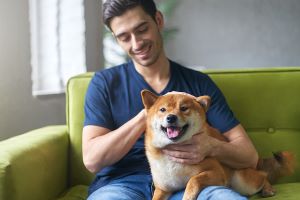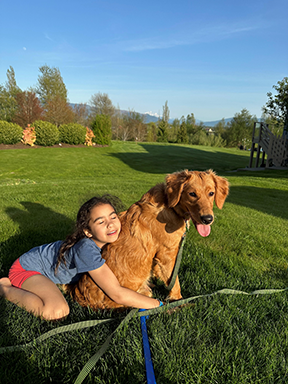 A new study published in iScience looked at whether pet and owner personality and mental wellbeing associate with attachment to cats and dogs.
A new study published in iScience looked at whether pet and owner personality and mental wellbeing associate with attachment to cats and dogs.
“We delved into the personality and mental wellbeing profiles of both owners and their pets (cats and dogs) concerning owners’ attachment insecurity, explicitly focusing on avoidant and anxious attachment styles,” study author Aada Ståhl told us. “This involved a comprehensive examination of how the owner's personality traits, psychological wellbeing, pet's personality traits, and unwanted pet behavior are intricately linked to the owner's attachment style towards their companion animal.”
By refining the profiles of owner-pet pairs behind the quality of the attachment relationship, the researchers hope to gain a deeper understanding of the psychological mechanisms involved and potentially shed light on effective strategies for promoting healthy relationships between humans and animals.
The associations between the personality of pets or the unwanted behavior of cats and pet attachment styles had not been previously studied.
“Still, we had hypotheses about how the unwanted behavior of dogs, the owner's personality, and the owner's mental well-being would be related to attachment styles,” Ståhl told us. “For example, we expected the neuroticism and lower mental wellbeing of the owner to associate with attachment anxiety and the aggressive behavior of dogs to associate positively with attachment avoidance and negatively with attachment anxiety.”

Human-pet attachment insecurity may substantially impact the owner's and pet's life and welfare. Previous studies into owner and pet characteristics that influence the human-animal bond are based on relatively small datasets, and possibly due to this, many studies have obtained contradicting results. The research team aimed to clarify these associations, as they proposed the most extensive inspection into human-pet attachment with a large dataset encompassing diverse owner and pet factors.
“We collected survey data using validated questionnaires of owner personality, attachment to pets, different aspects of mental well-being, and pet personality and behavioral questionnaires,” Ståhl told us. “We used structural equation modeling (SEM) to examine the association of owner personality and mental well-being and pet personality and unwanted behavior with attachment insecurity, separately looking at dog and cat owners. In this method, we could simultaneously explore contributing factors to both attachment styles.”
The research team observed that cat and dog owners with lower mental well-being exhibited higher anxious attachment to their pets. In the case of dog owners, these scores were also linked to an avoidant attachment style. The lower 'mental well-being' in dogs, reflected in unwanted behaviors, was associated with both attachment styles: aggression and ADHD-like behavior in dogs with avoidantly attached owners and fear-related behavior with anxiously attached owners.
“The personality traits of both cat and dog owners and their pets correlated with both insecure attachment styles,” Ståhl told us. “Specifically, owner neuroticism was linked to an anxious attachment style. Moreover, owners of more active cats and, conversely, more conscientious cat owners showed higher levels of anxious attachment. Among dog owners, those who were more neurotic, agreeable, and extroverted were less likely to exhibit avoidant attachment to their dogs. In general, dogs and cats that were more sociable with humans had owners with fewer avoidant attachment tendencies.”
While the study aligned with several existing findings, the researchers encountered some unexpected outcomes. Contradictions emerged, with specific associations differing from prior research. For instance, a previous study linked high neuroticism to low attachment avoidance in cats; however, the researchers observed this pattern in dogs but not cats. Contrary to expectations, the researchers did not uncover the anticipated connection between avoidant attachment and owner openness. Similarly, their assumption that more conscientious cat owners would exhibit lower anxious attachment proved incorrect. Instead, they found that higher conscientiousness was associated with increased anxiety in cat owners. Additionally, they found that owner agreeableness correlated with reduced avoidant attachment in dog owners—a departure from established pet attachment studies. However, this aligns with broader research linking agreeableness to positive aspects of the human-pet relationship, such as a stronger bond and relationship quality with dogs.
“In summary, our study sheds light on the intricate dynamics between pet owners and their animals, highlighting the role of both human and pet characteristics on attachment styles,” Ståhl told us. “The practical implications of these findings extend to interventions for pet behavioral issues and guiding prospective pet owners. For instance, enhancing interventions for pet behavioral issues could involve considering the owner's attachment-style-related behavior. Future research could delve deeper into specific interventions tailored to different attachment styles and explore the long-term effects of improving attachment security. Furthermore, a deeper understanding of these connections can assist prospective pet owners in making more informed decisions when acquiring a pet.”
Patricia Tomasi is a mom, maternal mental health advocate, journalist, and speaker. She writes regularly for the Huffington Post Canada, focusing primarily on maternal mental health after suffering from severe postpartum anxiety twice. You can find her Huffington Post biography here. Patricia is also a Patient Expert Advisor for the North American-based, Maternal Mental Health Research Collective and is the founder of the online peer support group - Facebook Postpartum Depression & Anxiety Support Group - with over 1500 members worldwide. Blog: www.patriciatomasiblog.wordpress.com
Email: tomasi.patricia@gmail.com